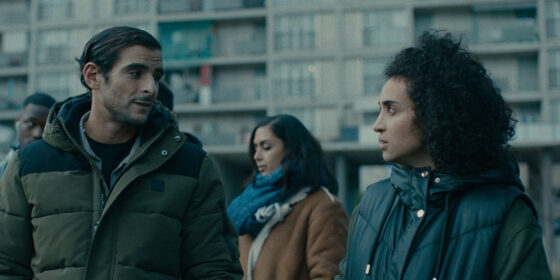TIFF 2023 | After the Fire (Mehdi Fikri, France) — Discovery

By Lawrence Garcia
The inciting incident of After the Fire is regrettably familiar: the murder of Karim, a 25-year-old Arab man, at the hands of police, in what a news report later calls a “sensitive neighbourhood” of Strasbourg, France. Riots ensue. The police say the cause of death was an epileptic fit, a claim that is falsified in a subsequent investigation. Although the District Attorney is supposed to remain impartial, he immediately sides with the cops. Meanwhile, a journalist covering the fallout does a profile of Karim, releasing his criminal record and history of drugs. Against these unfavourable odds, Karim’s family, led by the efforts of his sister, Malika (Camélia Jordana), seeks justice for his death, mounting a concerted attack on France’s racist justice system.
In telling this story, writer-director Mehdi Fikri, here making his feature debut, has packed in an impressive amount of incident in just 96 minutes. Not five minutes goes by without another significant development, obstacle, or detour—some force or tension that must be resolved as quickly as possible so the film can move on to the next crisis. Roughly an hour into the film, for example, Malika returns to Karim’s now-empty apartment and unexpectedly runs into his girlfriend, unknown to his friends and family, but who was present on the night of the murder. And although she initially runs away out of fear, she later returns, gives her account of the night, and agrees to be a witness during the trial—all within the space of ten minutes. (She is never seen or heard from thereafter.) After the Fire does, it is true, make room for two short scenes where Malika and her family spend time together without advancing the plot, and even break into song. But it is indicative of Fikri’s overall approach that the first of these sequences directly leads into the film’s most significant dramatic turn, while the other, which effectively functions as a flashback, comes right at the end.
The film’s closing credits make clear that while the story is fiction, “it is based on the real struggles of many families,” a statement Fikri follows with documentary footage of those he is referring to. If this final gesture is jarring, however, this is because the juxtaposition only makes clear how bloodless the rest of the film is, despite its real-life inspiration. Indeed, it makes clear that there are no specifics of culture, character, or setting that cannot be ironed out, abstracted away by the demands of a conventionally “gripping” plot.
Lawrence Garcia

